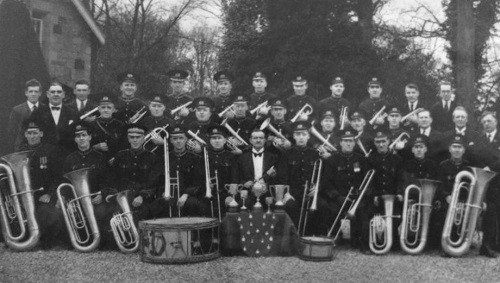The History Of Wrexham’s Brass Bands

In this week’s look back at Wrexham’s History, today we take a look back at the history of the Rhos Silver Brass Band.
Wrexham brass (Glyndwr) was formally known as The Rhos Silver Band was originally formed in 1884, making the band the oldest arts organisation based in the unique village of Rhosllannerchrugog, near Wrexham. The Rhos as it is known, not only boast a brass band but it also provides a base for two world class male voice choirs, a mixed choir and a very successful Operatic Society. The band was formed under its original name of the Rhos Prize Silver Band, however that name changed when the villages greatest employer of that time, the Hafod Colliery decided to adopt the band.
The band became the Hafod Colliery Band and grew to be an integral part of the local community. After the closure of Hafod in 1968 the band was renamed Rhos and District Silver, reflecting the change in playing personnel and the extension of outreach of the band to the surrounding Wrexham area.
When the Colliery closed, the band went through years of uncertainty and was in danger of collapsing. In the 1980’s a group of former players and young people came together with the objective to re-establish and strengthen the band. This resulted in steady improvement and in 1986 under the direction of Merfyn Hughes, the band gained promotion to the third section.
In 1991, the arrival of Lindsay Lawrie a Scottish euphonium player of some pedigree in the 1960’s signalled the beginning of further success. In the early 1990’s the band enjoyed contest success competing in the both the North West of England and North Wales. Lindsay led the band to success at the Buxton Festival in 1991 playing Royal Parks off draw number one. He put them on the road to success at contesting level. He led them for the first time in a number of years to the National Finals of the Third Section were we came a creditable fourth
After Lindsay left due to relocation, the band employed Duncan Beckley a famous Tuba player originally from Yorkshire. Under his leadership the band gained second prize in the Welsh Regional Championships. For the National Finals the band employed Ian Brownbill, a flugel player who has played with all the top bands both in Yorkshire and Lancashire. The band did extremely well to gain second prize in only the bands first year competing in Section Two.
Throughout the year the band gained a several number of prizes competing all round the country. Under Ian Brownbill’s guidance they attained prizes in the North West at Rochdale’s and Preston’s Festival of Brass and in North Wales at the Rhyl Festival of Brass.
Once again in 1997, Rhos band qualified for the National Finals that were held in the Symphony Hall in Birmingham. They beat off competition from 18 other bands from the 9 brass band areas of the UK to win the National Championships for the first time in the bands history. Winning such a prestigious prize meant automatic promotion to the First Section.
In 1998, Ms Sarah Groake joined the band as Musical Director. Under her leadership the band once again qualified as runners-up in Wales in the First Section. Sarah was studying at Salford University for her MA (Mus) Band Musicianship when she was conducting the band.
The band then employed the services of Iain Davey a leading euphonium player who had played for many of the leading brass bands in the country. Iain has led the band to victory in both the North Wales Open Championships and the qualification to the 2000 National finals that were held in the Royal Albert Hall
In the year 2001 the band undertook major changes, due to job relocation to Scotland Iain left the band and the band employed the services of Wayne Rusdon. Under Wayne the band has enjoyed unparallel success and has enjoyed success on contest stage both a regional and national level, including 2 National Pontins Championships Wins (First Section) and successive appearances at national finals and qualification performances at regional level (See Recent contest Results)
It was during 2001 that the band changed its name to Wrexham Brass (Glyndwr) the band had become homeless due to financial constraints on the local Rhos council forcing us to move outside the village. After several new homes the band is very grateful to Professor Michael Scott the Dean of the North East Wales Institute of Higher Education who gave us rehearsal and storage facilities in the fantastic William Aston Hall based on the Mold Road Campus of the University.
Rhos Brass Band, (1884)
Rhos Prize Silver Band, (1884)
Hafod Colliery Band, (1968)
Rhos and District Silver Band (1968-2000),
Wrexham Brass (2000-present)
Written by: Graham Lloyd for Wrexham History. More of Wrexham’s history can be found on one of our favourite websites, www.wrexham-history.co.uk
Spotted something? Got a story? Email [email protected]












